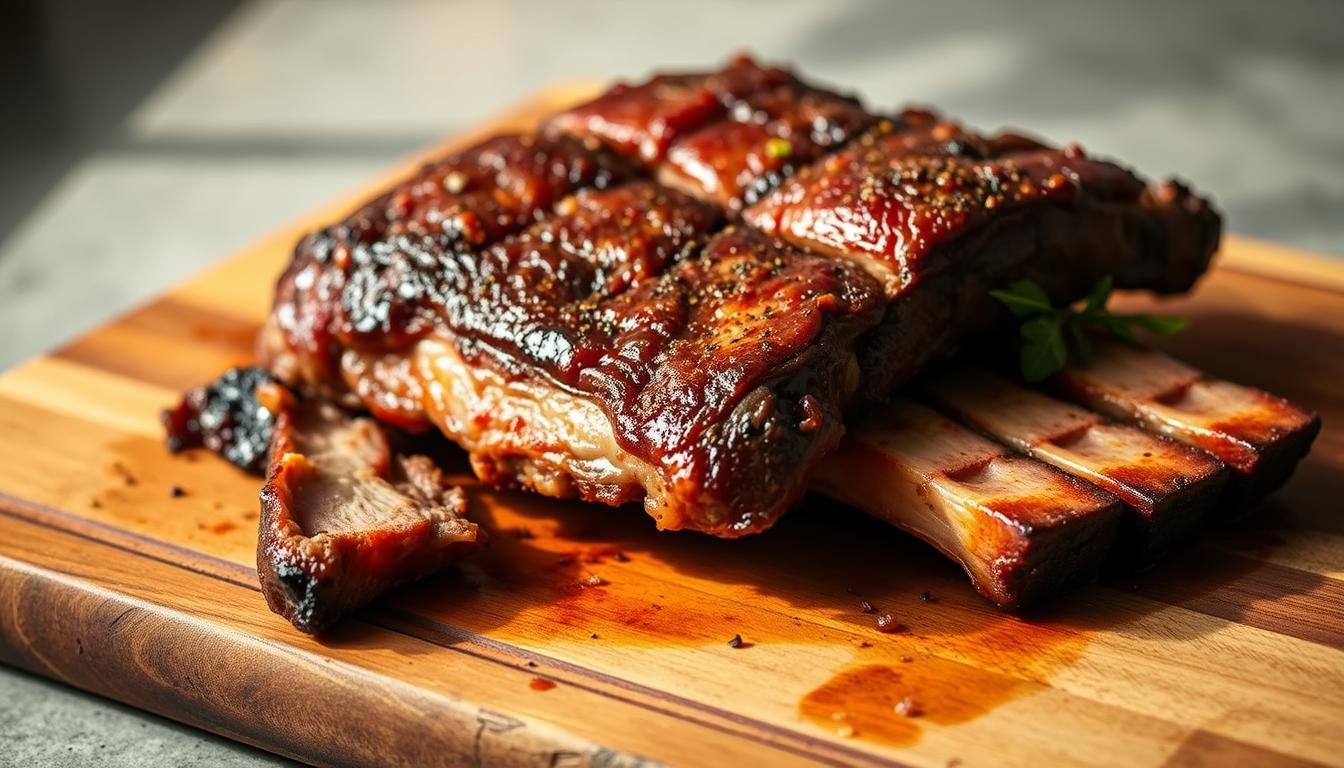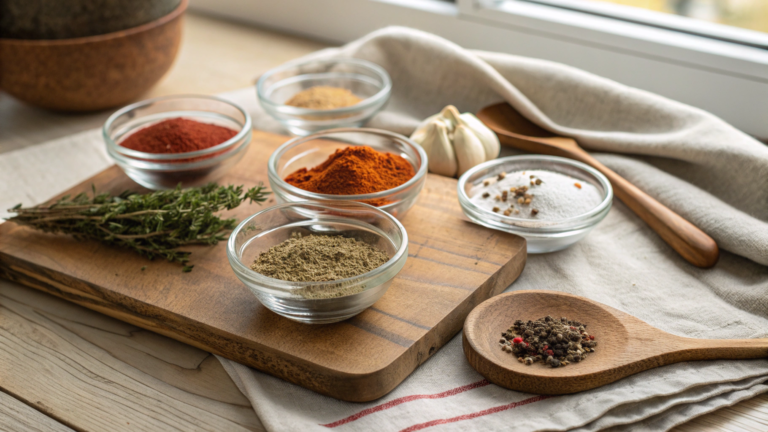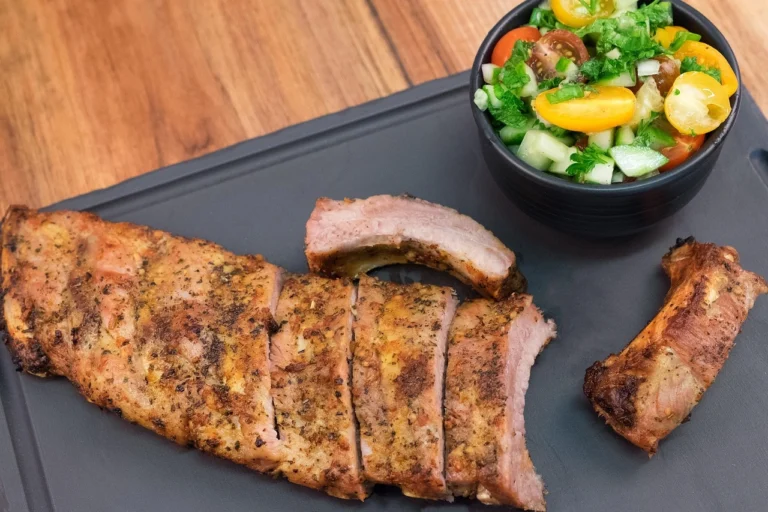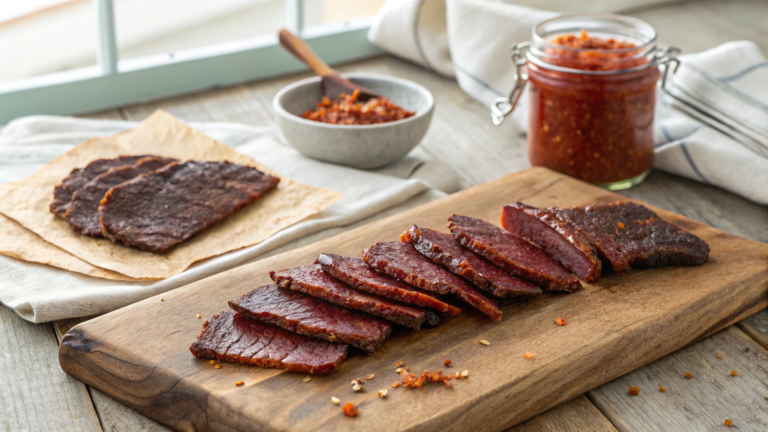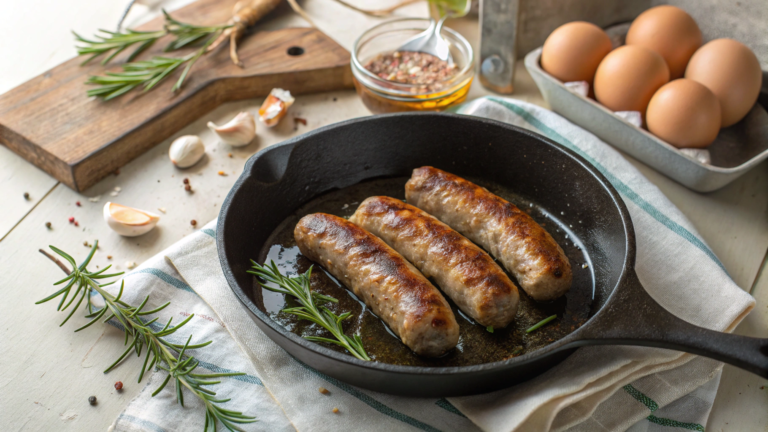Boneless Beef Short Ribs Recipe for Tender, Juicy Meals
Turning tough meat into a delicious dish is magical. My adventure with boneless beef short ribs started on a cold autumn night. I wanted comfort food that would warm me up inside and out. The rich flavors and tender meat have become my go-to dish.
A boneless beef short ribs recipe is more than food—it’s an experience. These ribs come from the cow’s chuck area, promising a unique dining adventure. Whether you’re cooking at home or dreaming of being a chef, this recipe will boost your skills and wow everyone.
Prepare to turn your kitchen into a fancy restaurant. With the right techniques, your boneless beef short ribs will be the highlight of any meal.
Key Takeaways
- Boneless beef short ribs offer exceptional tenderness and flavor
- Proper preparation is crucial for achieving melt-in-your-mouth texture
- The recipe serves 6 people with just 226 calories per serving
- Cooking methods can vary from Instant Pot to slow cooker
- Short ribs can be stored in the refrigerator for 3-4 days
What Makes Boneless Beef Short Ribs Special
Braised beef short ribs are a true culinary gem. They offer amazing flavor and are packed with nutrients. These tender cuts are loved by both home cooks and chefs for their rich taste and cooking flexibility.
Learning about boneless beef short ribs can take your cooking to new heights. It helps you make unforgettable meals for your loved ones.
Understanding the Cut
Boneless short ribs come from the cow’s rib section’s lower part. Unlike traditional bone-in cuts, these ribs are trimmed to give you more meat and less bone. The marbling in these ribs makes them incredibly tender, creating a truly special eating experience.
Nutritional Benefits
- High in protein (50g per serving)
- Rich source of essential minerals
- Contains important nutrients like:
- Iron (6 mg per serving)
- Zinc
- Vitamin B complex
Why Choose Boneless Over Bone-in
Boneless beef short ribs are a great choice for home cooks. They’re easier to prepare, cook more evenly, and are simpler to portion. When braising, boneless cuts allow for better seasoning and quicker cooking.
Pro tip: Look for well-marbled cuts with a deep red color for the most flavorful braised https://www.meatsage.com/beef/beef experience.
Essential Ingredients for Perfect Short Ribs
Starting a delicious short rib stew or slow cooker beef ribs is all about the ingredients. You’ll need top-notch boneless beef short ribs for tender, flavorful bites.
For the best short rib sthttps://www.thekitchenwhisperer.net/2014/03/23/the-ultimate-slow-baked-boneless-beef-short-ribs/ew, gather these ingredients:
- 6 pounds of boneless beef short ribs (about 12 ribs)
- Kosher salt and freshly ground black pepper
- Garlic powder for deep flavor
- All-purpose flour for dredging
- Olive oil or vegetable oil
- Aromatic vegetables:
- Onions
- Carrots
- Celery
For your slow cooker beehttps://www.meatsage.com/beef/f ribs, add these extra flavor boosters:
- 6 cups of beef stock
- 1 (750-ml) bottle of dry red wine
- Optional: BBQ sauce for extra depth
- Fresh herbs like thyme or rosemary
Pro tip: The quality of your ingredients directly impacts the final taste of your short rib dish.
When getting your ingredients ready, choose marbled beef short ribs for the best tenderness and taste. The right mix of seasonings and braising liquids will make your meat incredibly rich and tender.
Preparing Your Boneless Beef Short Ribs Recipe
Turning smoked beef ribs into a tasty dish needs careful prep and focus. Whether you’re making barbecue beef ribs or a classic braised dish, the right steps can make your cooking stand out.
Seasoning and Dredging Techniques
Seasoning is key for flavor in your short ribs. Begin by mixing a strong seasoning blend with:
- 1 tablespoon kosher salt
- 1 teaspoon black pepper
- 1 tablespoon garlic powder
- Optional: ½ teaspoon onion powder
- Optional: 1 teaspoon chili powder
To get a great crust, dredge your ribs in ¼ cup of all-purpose flour before searing. This method makes a tasty outside that keeps moisture in and adds flavor to your barbecue beef ribs.
Essential Equipment
Before cooking, make sure you have these important tools:
- Heavy-bottomed Dutch oven or large skillet
- Meat thermometer
- Tongs
- Cutting board
- Sharp knife
Pre-Cooking Preparation
Getting your smoked beef ribs ready is key for tenderness and flavor. Take the ribs out of the fridge 30 minutes before cooking to warm them up. Dry the meat with paper towels to help the seasoning stick and sear better.
Pro tip: Choose a cooking oil with a high smoke point like vegetable or sunflower oil for the best searing results.
Your 4-pound batch of boneless short ribs will feed 6 to 8 people. It takes about 3 hours and 10 minutes to cook. Follow these steps closely to make a meal that will wow your guests.
Cooking Methods and Techniques
Preparing oven-baked beef ribs needs you to know about different cooking ways. These methods can turn this cut into a delicious meal. Each way has its own benefits for making tender, tasty dishes.
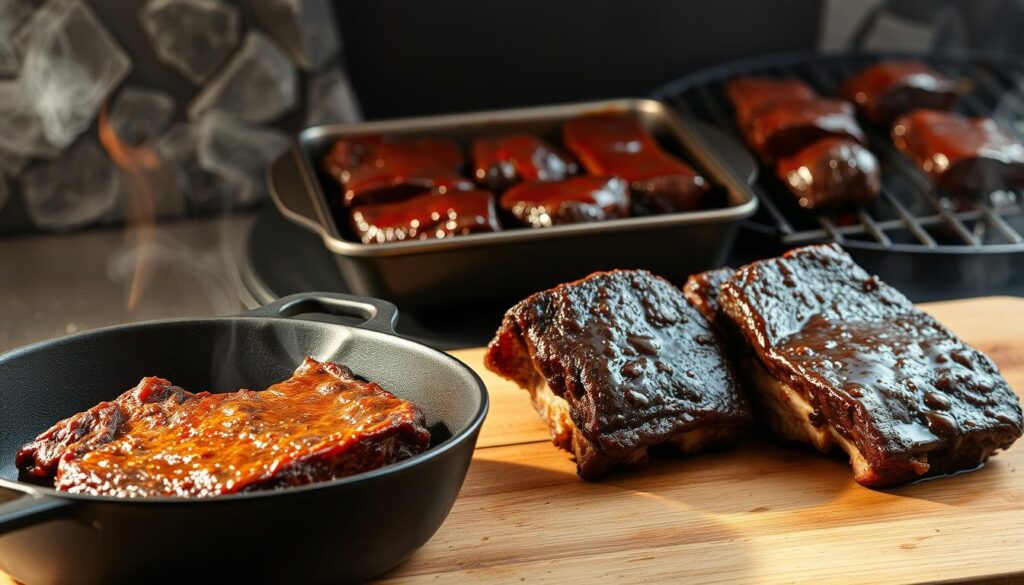
- Oven Braising: Slow cooking at low temperatures (around 325°F)
- Slow Cooker: Perfect for hands-off preparation
- Pressure Cooking: Quick and efficient method
- Grilling: Creates delicious smoky flavor
Braising is the most loved technique for beef rib ragu. It involves searing the meat first, then cooking it slowly in liquid. This makes the meat very tender. Braising takes about 2-5 hours, depending on the recipe.
| Cooking Method | Average Cooking Time | Temperature |
|---|---|---|
| Oven Braising | 3-4 hours | 325°F |
| Slow Cooker | 5-8 hours | Low (200°F) |
| Grilling | 14-16 minutes | Medium-high |
Pro tip: Always let your oven-baked beef ribs rest for 10 minutes after cooking. This lets the juices spread evenly, making each bite super juicy.
The key to perfect short ribs is patience and low, slow cooking.
Try out different techniques to find your favorite way to make these tasty beef rib dishes.
Perfect Braising Liquid Combinations
Creating the perfect braising liquid is key to making your boneless beef short ribs recipe amazing. The right mix of liquids and aromatics can take your braised beef from good to great.
Choosing the right braising liquid is about knowing how different ingredients work with the rich flavors of short ribs. Your liquid base does more than just cook the meat. It adds depth and complexity to every bite.
Wine-based Braising Techniques
Red wines add exceptional richness to your boneless beef short ribs recipe. Here are some wine options:
- Cabernet Sauvignon for deep, bold flavors
- Pinot Noir for lighter, more delicate notes
- Merlot for smooth, rounded taste profiles
Beer and Stock Combinations
Looking beyond wine opens up exciting flavor possibilities for braised beef. Dark beers like stouts or porters add incredible depth. Beef stock provides a classic, robust foundation.
“The secret to incredible braised beef is layering flavors through your liquid base.” – Professional Chef
Enhancing with Aromatics
Aromatics make your braising liquid go from simple to spectacular. Key ingredients include:
- Fresh thyme sprigs
- Minced garlic
- Diced onions
- Rosemary branches
Use about 2 cups of liquid – a mix of wine and beef broth works well. Your goal is to almost cover the short ribs. This creates a flavor-packed environment for slow cooking.
Temperature and Timing Guide
Getting the perfect slow cooker beef ribs or smoked beef ribs needs careful temperature control and timing. Knowing these key points helps you make meat that’s tender and falls off the bone.
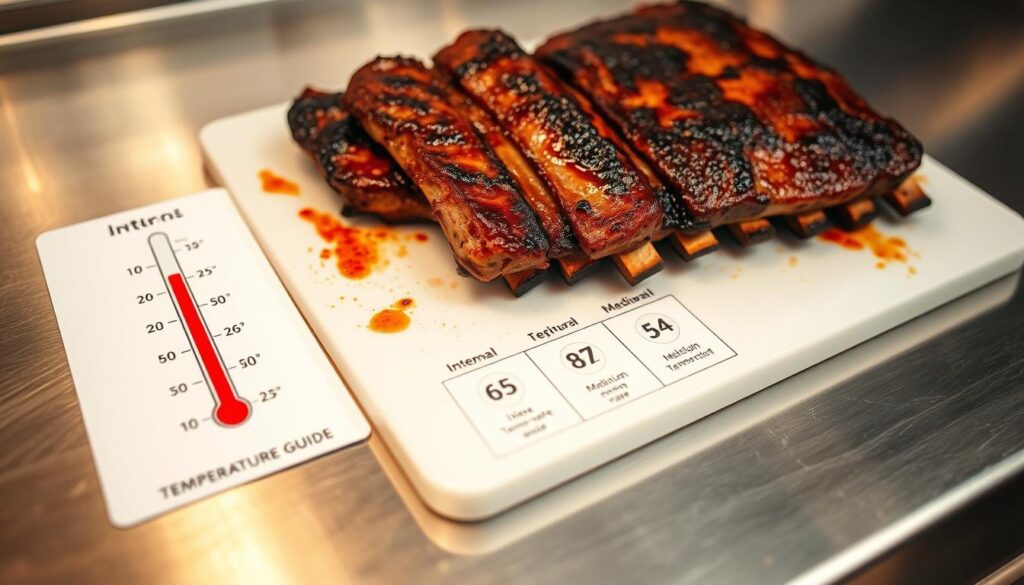
Different cooking methods need different temperatures for boneless beef short ribs:
- Oven Braising: Set your oven to 300°F and plan for 2.5-3 hours of cooking time
- Slow Cooker Method: Cook on low heat for 6-8 hours for maximum tenderness
- Instant Pot/Pressure Cooking: Approximately 45 minutes under high pressure
- Smoker Technique: Target internal temperature of 205-210°F
When making smoked beef ribs, it’s important to track the internal meat temperature. Use a reliable meat thermometer to make sure your ribs are cooked just right. For most beef cuts, aim for an internal temperature between 195-205°F for that melt-in-your-mouth feel.
Pro tip for slow cooker beef ribs: Low and slow is the secret. Being patient during cooking lets connective tissues break down. This makes the meat incredibly tender and will wow your dinner guests.
Creating the Perfect Sauce
Turning your braising liquid into a rich sauce is the key to making your beef rib ragu stand out. This process needs careful attention and a few important techniques to bring out deep flavors.
The secret to a great sauce is in reducing and thickening it right. You want a sauce that sticks well to your barbecue beef ribs. This way, every bite is packed with flavor.
Reducing the Braising Liquid
Reduction is key to deepening the sauce’s flavor. Here’s how to do it:
- Strain the braising liquid through a fine-mesh sieve
- Remove excess fat using a fat separator
- Simmer the liquid over medium heat
- Reduce volume by about 50%
Sauce Thickening Methods
There are several ways to get the sauce just right:
- Cornstarch Slurry: Mix 1 tablespoon cornstarch with 2 tablespoons cold water
- Roux Technique: Blend equal parts butter and flour
- Reduction Method: Keep simmering until it’s thick enough
Don’t forget to taste and adjust the seasonings as you go. A bit of salt or some red wine can really boost your beef rib ragu’s taste.
Serving Suggestions and Storage
When serving your delicious beef ribs, pair them with creamy mashed potatoes, roasted root vegetables, or a crisp green salad. A short rib stew tastes amazing with crusty bread that soaks up the rich sauce. Arrange the tender meat neatly and drizzle braising liquid around the plate for a better dining experience.
Storage is key to keeping your beef ribs fresh. Refrigerate leftovers in an airtight container for up to 5 days. Freeze your short rib stew in sealed containers for up to 2 months. When reheating, use low and slow methods to keep the meat tender.
To keep your ribs moist, reheat them in the oven at 325°F, covered with foil. Add a splash of broth or braising liquid. This method ensures your leftover ribs stay tender and delicious, just like when they were first made.
Portion control is important when storing your short rib dishes. Divide larger batches into individual servings before refrigerating or freezing. This makes meal prep easier and lets you enjoy your beef ribs all week long.

